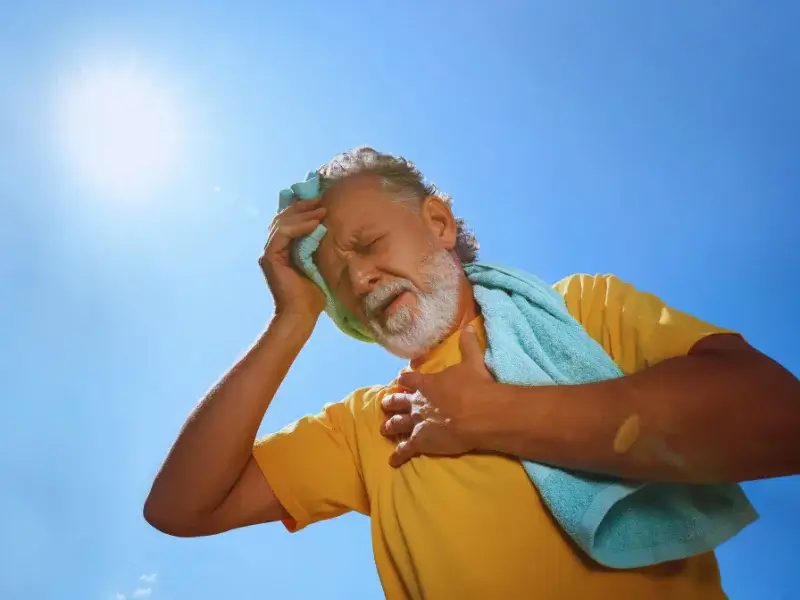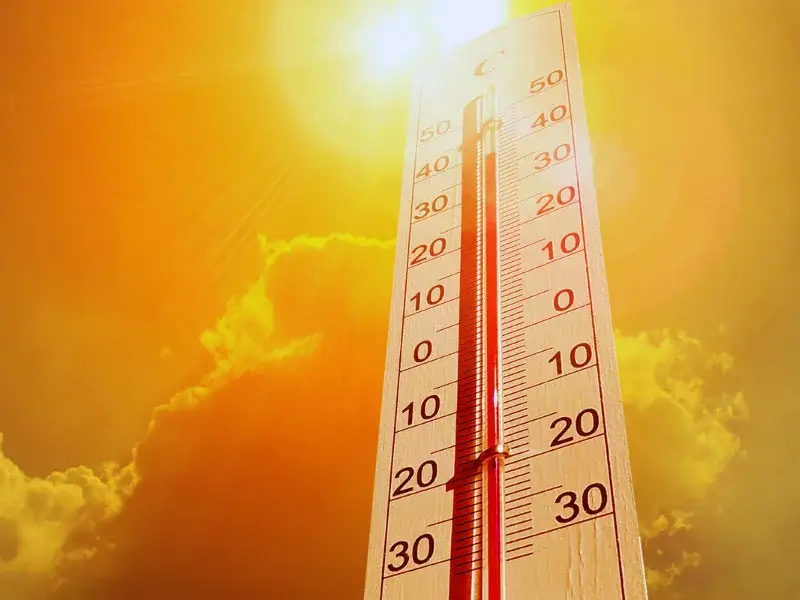You may notice signs of irritability, low mood, or trouble concentrating during long heat waves.
This is because heat related anxiety can make existing mental health conditions worse and create new stress for people who have not struggled before.
The World Health Organization notes that climate events and slow-onset changes can trigger depression, anxiety, and post-traumatic stress symptoms.
If you live in Phoenix, Yuma, Flagstaff, or any Arizona town that is seeing longer heat seasons, you are not alone; cities here are setting new heat records that affect daily life.
CNS Center Arizona can help you detect how heat affects mood and thinking, what signs to watch for, and simple steps you can take to protect your mental health.
Heat And Mental Health Research
Emergency Visits, Suicide, And Heat-Related Mental Health Effects
Multiple studies have found that higher temperatures are linked to more emergency department visits for mental health problems, including anxiety and worsening mood.
A multi-year study in the United States found warm-season increases in emergency visits for a range of mental health conditions, suggesting heat can trigger acute symptoms.
Other research ties temperature rises to a modest increase in suicide in some regions, with projections warning of more deaths if warming continues.
These links are not a single cause-and-effect line, but the pattern is strong enough for public health agencies to pay attention.
Systematic Reviews And Global Findings
Reviews that look across many studies find consistent signals: heat waves and extreme heat are associated with anxiety, depression, cognitive problems, and a rise in aggressive behavior.
Different methods and places produce mixed exact numbers, but the overall trend is clear that heat makes mental health problems more likely or more severe.
That is one reason public health groups call climate change a mental health issue as well as an environmental one.
How Heat Affects Brain Function And Mood
Biological Pathways: Sleep, Hydration, And Neurochemistry
Heat can change your sleep, and poor sleep quickly makes mood and thinking worse.
When nights stay warm, your body makes less melatonin and you get lighter sleep, which raises anxiety and lowers mood the next day.
Dehydration and salt imbalance from heat stress affect brain cells and can cause headaches, confusion, and low tolerance for stress.
These physical changes combined with the stress of dealing with heat such as lost work hours, power outages, or canceled plans can amplify symptoms over time.
Cognitive Effects: Attention, Memory, And Reaction Time
Even short exposure to very high temperatures can slow reaction time, make it harder to concentrate, and reduce short-term memory.
Studies show test scores and job performance can drop during heat waves, and people report more difficulty planning and staying on task.
If you already have attention problems or mood disorder, heat can deepen those symptoms and make routine tasks feel overwhelming.
This is important for parents, students, and people who do work that needs focus or quick decisions.
Heat And Depression: A Two-Way Relationship
Heat and depression often interact in two directions.
Heat can worsen sleep and daily functioning, increasing the burden that leads to low mood.
And when someone is depressed, they may be less likely to take actions that keep them cool and safe, such as going to a cooling center or staying hydrated.
Recognizing this two-way effect helps you see when heat is making an existing condition worse and when new symptoms need care.
Climate Change Anxiety: Effects Of Climate Change On Mental Health In Arizona

What Climate Change Anxiety Looks Like
Climate change anxiety is worry about current or future harms from environmental change.
You might feel constant worry, sadness about lost places, or a strong urge to act.
Young people often report climate-related worries more intensely, and parents can feel extra stress about the future their children will inherit.
This worry can sit in the background and lower daily pleasure, or it can spark panic or trouble sleeping during very hot spells.
Local Context: Why Arizona Faces Special Risks
Arizona’s long summers, droughts, and growing wildfire seasons make the state a place where climate change is felt in daily life.
Phoenix and other cities have recorded extreme warm years and long runs of triple-digit days that change routines and limit safe outdoor time.
That steady pressure, which is reflected by the loss of outdoor spaces, higher utility bills, and the stress of planning around heat, adds to climate change mental health risk.
For people who depend on the land for work or who have limited cooling options, the stress is even greater.
Local Impact of Heat Related Anxiety in Arizona
Urban Heat Islands And Indoor Heat Stress
City neighborhoods with little shade and lots of pavement can be several degrees hotter than greener areas, a problem known as the urban heat island.
For people in older homes, mobile homes, or apartments without reliable cooling, indoor heat can reach dangerous levels and cause sleep loss and anxiety.
Public weather services and local health departments warn that heat is now the deadliest weather risk in Arizona, and that fact has both physical and mental health implications.
Rural Communities, Farmers, And Agricultural Workers
Rural communities and farmworkers face work in the heat, water shortages, and economic strain from drought.
When income and food security are threatened, mental health problems can grow fast.
Programs that support cooling spaces, community checks, and access to care are important for these groups, who may live far from psychiatric services.
Children, Teens, And Older Adults: Special Considerations
Children and teens are still developing coping skills, and warm nights or canceled outdoor activities can create or worsen anxiety and behavior problems.
Older adults may have medical conditions or medications that make them less able to tolerate heat; that increases both physical risk and emotional stress.
Families and caregivers should watch for changes in sleep, appetite, mood, or confusion during heat waves.
Signs Of Heat Related Anxiety And Depression You Should Watch For
Emotional And Behavioral Red Flags
If you notice persistent worry about the future, more irritability, trouble sleeping, or loss of interest in things you usually enjoy, these can be signs of heat related anxiety or depression.
Heat can also make substance use and anger more likely, so take shifts in behavior seriously.
If a young person becomes withdrawn, stops going to school, or shows sudden mood swings, get support sooner rather than later.
Physical And Cognitive Red Flags
Headaches, dizziness, confusion, and trouble concentrating can be direct effects of heat on the body and brain.
If you or someone you care for seems forgetful, slow to respond, or unusually sleepy, cooling, hydration, and a medical check can be lifesaving.
If these signs come with thoughts of harming yourself, call 988 or local emergency services immediately.
When To Seek Professional Help For Heat Related Anxiety Or Depression
Red Flags That Mean You Need Evaluation
If sleep loss, panic, persistent low mood, suicidal thoughts, or trouble functioning at work or home lasts more than two weeks, reach out for a psychiatric evaluation.
Heat can trigger sudden worsening in people with mood disorders or psychosis, and an expert can guide safe care.
You can start with your primary care doctor or contact a psychiatric clinic to schedule an evaluation.
Medication, Heat, And Mental Health
How Heat Interacts With Some Psychiatric Medications

Some psychiatric medications change how your body handles heat or sweat.
For instance, many antipsychotics and some antidepressants can affect temperature regulation and increase risk for heat illness.
If you take medication, check with your prescriber about steps to stay safe during heat waves.
Small adjustments or closer follow-up may be needed on very hot days.
Talk To Your Psychiatrist Before Making Changes
Do not stop or change medications without talking to your psychiatrist.
If you have increased side effects in the heat such as dizziness, lightheadedness, or confusion, call your clinic to ask about monitoring or an earlier follow-up.
Your prescriber can help balance the benefits of treatment with safety during extreme temperatures.
How CNS Center Of Arizona Can Support You
Clinical Services Relevant To Heat Related Anxiety
CNS Center of Arizona provides psychiatric evaluation, medication management, and individual psychotherapy for children, adolescents, and adults.
If heat makes your anxiety or mood worse, a structured evaluation can identify triggers, diagnose conditions, and set a clear treatment plan.
Telepsychiatry visits are available across Arizona, Colorado, and Utah, which helps you connect with care without traveling when weather is severe.
Evidence-Based Treatments And Collaborative Care
Treatment options include cognitive behavioral therapy for anxiety, medication when appropriate, and coordinated referrals to therapists and community services.
Our psychiatrists use a biopsychosocial approach that looks at biological, psychological, and social factors, such as heat exposure or housing, to personalize the care you need.
Resources And Community Supports For Heat Related Stress
Local Cooling And Public Health Resources
Check your county health department or city website for cooling center locations and heat alerts. The National Weather Service also issues heat warnings and guidance for staying safe during extreme heat.
National Hotlines And Immediate Help
For immediate crisis support, call or text 988 to reach the Suicide & Crisis Lifeline any time.
The line connects you to trained counselors who can help you manage immediate risk and find local services.
For urgent medical problems like heatstroke, call 911 or go to the nearest emergency department.
Manage Heat and Climate Change Anxiety With CNS
Climate change anxiety and the effects of climate change on mental health are real concerns for many Arizona families.
CNS Center of Arizona provides psychiatric evaluation, medication management, and psychotherapy by clinicians who treat children, adolescents, and adults.
Telepsychiatry is available across Arizona, Colorado, and Utah to help you connect with care even when travel is hard or weather is extreme.
If you or someone you know is in immediate crisis, call or text 988 right now for support.
You do not have to manage heat related anxiety on your own; help is available, and the first step is reaching out.





